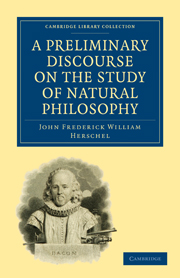Book contents
- Frontmatter
- Contents
- Dedication
- PART I OF THE GENERAL NATURE AND ADVANTAGES OF THE STUDY OF THE PHYSICAL SCIENCES
- PART II OF THE PRINCIPLES ON WHICH PHYSICAL SCIENCE RELIES FOR ITS SUCCESSFUL PROSECUTION, AND THE RULES BY WHICH A SYSTEMATIC EXAMINATION OF NATURE SHOULD BE CONDUCTED, WITH ILLUSTRATIONS OF THEIR INFLUENCE AS EXEMPLIFIED IN THE HISTORY OF ITS PROGRESS
- CHAP. I Of Experience as the Source of our Knowledge. — Of the Dismissal of Prejudices. — Of the Evidence of our Senses
- CHAP. II Of the Analysis of Phenomena
- CHAP. III Of the State of Physical Science in General, previous to the Age of Galileo and Bacon
- CHAP. IV Of the Observation of Facts and the Collection of Instances
- CHAP. V Of the Classification of Natural Objects and Phenomena, and of Nomenclature
- CHAP. VI Of the First Stage of Induction. — The Discovery of Proximate Causes, and Laws of the lowest Degree of Generality, and their Verification
- CHAP. VII Of the higher Degrees of Inductive Generalization, and of the Formation and Verification of Theories
- PART III OF THE SUBDIVISION OF PHYSICS INTO DISTINCT BRANCHES, AND THEIR MUTUAL RELATIONS
- Index
CHAP. III - Of the State of Physical Science in General, previous to the Age of Galileo and Bacon
Published online by Cambridge University Press: 29 August 2010
- Frontmatter
- Contents
- Dedication
- PART I OF THE GENERAL NATURE AND ADVANTAGES OF THE STUDY OF THE PHYSICAL SCIENCES
- PART II OF THE PRINCIPLES ON WHICH PHYSICAL SCIENCE RELIES FOR ITS SUCCESSFUL PROSECUTION, AND THE RULES BY WHICH A SYSTEMATIC EXAMINATION OF NATURE SHOULD BE CONDUCTED, WITH ILLUSTRATIONS OF THEIR INFLUENCE AS EXEMPLIFIED IN THE HISTORY OF ITS PROGRESS
- CHAP. I Of Experience as the Source of our Knowledge. — Of the Dismissal of Prejudices. — Of the Evidence of our Senses
- CHAP. II Of the Analysis of Phenomena
- CHAP. III Of the State of Physical Science in General, previous to the Age of Galileo and Bacon
- CHAP. IV Of the Observation of Facts and the Collection of Instances
- CHAP. V Of the Classification of Natural Objects and Phenomena, and of Nomenclature
- CHAP. VI Of the First Stage of Induction. — The Discovery of Proximate Causes, and Laws of the lowest Degree of Generality, and their Verification
- CHAP. VII Of the higher Degrees of Inductive Generalization, and of the Formation and Verification of Theories
- PART III OF THE SUBDIVISION OF PHYSICS INTO DISTINCT BRANCHES, AND THEIR MUTUAL RELATIONS
- Index
Summary
(96.) It is to our immortal countryman Bacon that we owe the broad announcement of this grand and fertile principle; and the developement of the idea, that the whole of natural philosophy consists entirely of a series of inductive generalizations, commencing with the most circumstantially stated particulars, and carried up to universal laws, or axioms, which comprehend in their statements every subordinate degree of generality, and of a corresponding series of inverted reasoning from generals to particulars, by which these axioms are traced back into their remotest consequences, and all particular propositions deduced from them; as well those by whose immediate consideration we rose to their discovery, as those of which we had no previous knowledge. In the course of this descent to particulars, we must of necessity encounter all those facts on which the arts and works that tend to the accommodation of human life depend, and acquire thereby the command of an unlimited practice, and a disposal of the powers of nature co-extensive with those powers themselves. A noble promise, indeed, and one which ought, surely, to animate us to the highest exertion of our faculties; especially since we have already such convincing proof that it is neither vain nor rash, but, on the contrary, has been, and continues to be, fulfilled, with a promptness and liberality which even its illustrious author in his most sanguine mood would have hardly ventured to anticipate.
- Type
- Chapter
- Information
- A Preliminary Discourse on the Study of Natural Philosophy , pp. 104 - 117Publisher: Cambridge University PressPrint publication year: 2009First published in: 1830

